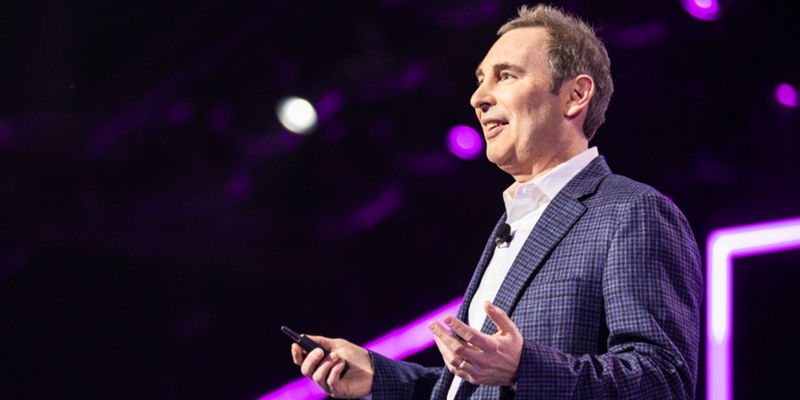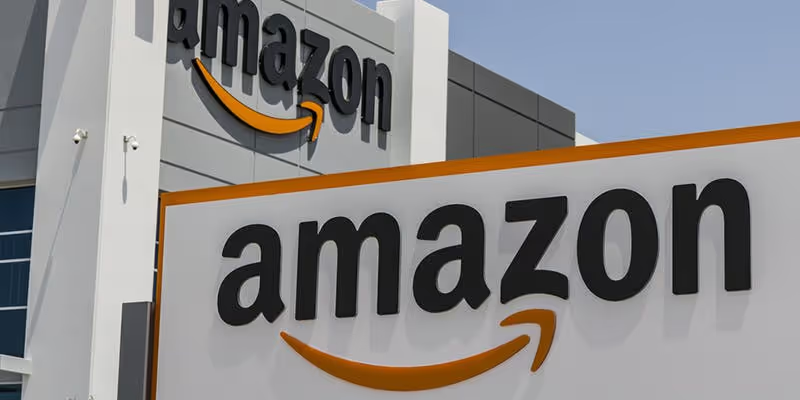Startup
Amazon profit soars 55% in Q3 driven by cloud growth

reported strong third-quarter results, with profit soaring 55.2%, fuelled by robust growth in its cloud computing business, which energised investor sentiment.
The tech firm’s shares rose by about 6% in after-hours trading.
The Seattle-based company reported a bottom line of $15.3 billion in its third quarter ended September 30, 2024, compared with $9.9 billion earned in the year-ago period.
Its cloud computing platform, Amazon Web Services (AWS), posted an operating income of $10.4 billion in Q3, up 49.7% year-over-year (YoY). This represents nearly 60% of its parent’s operating income of $17.4 billion in the third quarter.
AWS contributes significantly to the company’s topline and bottom line.
Amazon President and Chief Executive Officer Andy Jassy said that AWS now stands at a $110 billion annualised run rate. “We have seen significant reacceleration of AWS growth for the last four quarters,” he noted during the third-quarter earnings call.
In Q3, Amazon’s net sales rose 11% YoY to $158.9 billion, while AWS segment sales increased 19% YoY to $27.5 billion.
Amazon leads the cloud infrastructure market, competing with Microsoft and Google. According to data from Synergy Research Group, their market shares were 32%, 23%, and 12% respectively, as of Q2 2024.
Earlier this week, Alphabet said Google’s cloud business witnessed a 35% YoY jump in revenue, touching $11.3 billion in Q3 FY24, while Microsoft said its Azure and other cloud services revenue growth was 33% in Q1 FY25. These cloud business growth numbers are fuelled by a strong adoption of artificial intelligence.

AI opportunity
Amazon, like the others, is tapping into this big AI opportunity.
“AWS’s AI business is a multibillion-dollar revenue run rate business that continues to grow at a triple-digit year-over-year percentage and is growing more than three times faster at this stage of its evolution as AWS itself grew, and we felt like AWS grew pretty quickly,” Jassy remarked.
Tech giants like Amazon, Microsoft, Google, and Meta have significantly increased their capital expenditure to expand their server and data centre infrastructure, driven by the exponential growth of artificial intelligence (AI) and its demanding computational requirements.
“We have more demand that we could fulfil if we had even more capacity today. I think pretty much everyone today has less capacity than they have demand for, and it’s really primarily chips that are the area where companies could use more supply,” Jassy noted.
“We are growing at a very rapid rate and have grown a pretty big business here in the AI space. And it’s early days, but I actually believe that the rate of growth has a chance to improve over time as we have bigger and bigger capacity,” he added.
Amazon Senior Vice President and Chief Financial Officer Brian Olsavsky said that the company expects to spend approximately $75 billion in capex in 2024.
Jassy expects Amazon’s spending to increase in 2025, with the majority allocated to AWS, particularly due to the rise in generative AI.
“Data centres, for instance, are useful assets for 20 to 30 years. And so, I think we have proven over time that we can drive enough operating income and free cash flow to make this very successful return on invested capital business,” Jassy explained.
“We expect the same thing will happen here with generative AI. It is a really unusually large, maybe once-in-a-lifetime type of opportunity,” he added.
Stores and other businesses
Net sales from Amazon’s online stores reached $61.4 billion, an 8% increase year-over-year, while physical store sales were $5.2 billion, up 5% YoY.
Alongside its cloud business, advertising emerged as a strong performer for the company, with ads services sales rising 19% YoY to $14.3 billion for the quarter. This business managed to exceed the growth seen in Amazon’s core retail segment.
Meanwhile, the subscription services witnessed an 11% YoY growth to $11.3 billion.
For the fourth quarter—its largest of the year—the ecommerce giant provided guidance. Net sales are expected to range between $181.5 billion and $188.5 billion, up 7% to 11% compared with the year-ago period. Operating income is projected to be between $16.0 billion and $20.0 billion, up from $13.2 billion in Q4 2023.
“We are encouraged by the start of the holiday season, which kicked off in October with a strong Prime Big Deal Days,” Olsavsky said.
Startup
Prabhuji snack maker Haldiram Bhujiawala raises Rs 235 Cr

Kolkata-based packaged snack company Haldiram Bhujiawala has raised Rs 235 crore through a private placement from Pantomath’s Bharat Value Fund (BVF) for a minority stake.
The snacks maker, which retails under the ‘Prabhuji’ brand, registered a revenue of Rs 473 crore for FY23 while profits declined to Rs 1.7 crore for the year, according to data sourced from research platform Tracxn.
The company was established in 1992 by Manish Agarwal and Prabhu Shankar Agarwal and retails Haldiram’s Prabhuji and internet-first brand, . It has a portfolio of over 100 SKUs, with strong recognition in the Eastern and North Eastern markets. It also operates quick service restaurants in West Bengal and other North Eastern states.
“In the last 60+ years, we have cultivated a loyal customer base by offering delectable snacks and sweets. Our company has been a trendsetter, revolutionizing food habits and tastes of India,” said Manish Agarwal, Managing Director of Haldiram Bhujiawala in a statement.
He added, “Leveraging our industry insights alongside BVF’s support, we are strategically positioned to enhance shareholder value and drive growth. This partnership lays a solid foundation for generating long-term economic benefits, ensuring a prosperous future for all stakeholders.”
The snack maker competes in a market dominated by larger players like Nagpur-based Haldiram, Annapurna Snacks, and others. Haldiram Bhujiawala claims to have a distribution network of approximately 2000 distributors servicing over two lakh retailers across West Bengal, Bihar, Jharkhand, and North East India. It also operates 19 retail outlets and 60 franchise stores.
The snacks market is estimated to be a Rs 42,600 crore market by FY24, with a CAGR (Compound Annual Growth Rate) of 11%, dominated by packaged snack makers, according to data shared in the statement.
“We are pleased to partner with Haldiram Bhujiawala Limited. With over six decades of market insight since its founding as a proprietorship in 1958, the company has a deep understanding of consumer behaviour and market trends,” said Madhu Lunawat, CIO of BHarat Value Fund.
He added, “The new generation’s sharp focus on the modern brand, ‘Prabhuji,’ is particularly noteworthy. We are highly optimistic about the food, FMCG, and consumer goods sectors, and Haldiram is well-positioned to achieve substantial growth in the years ahead.”
This marks BVF’s sixth overall investment in the mid-market segment, backing profitable growth companies. It had also recently backed Millenium Babycares, maker of the flagship brand Bumtum.
Startup
Hosteller raises Rs 48 Cr in Series A round led by V3

Backpacker hostel brand The Hosteller has raised Rs 48 crore in a Series A funding round. V3 Ventures led the equity round, contributing Rs 32 crore, with Blacksoil providing an additional Rs 16 crore in venture debt.
Other key investors include Synergy Capital Partners, Unit e-Consulting, Real Time Angel Fund, and several high-profile investors like Harsh Shah from the Naman Group Family Office.
The investment will allow the company to strengthen its presence in cities like Rishikesh and Manali, while also expanding into new destinations across India.
“We aim to have 10,000 beds by March 2026 from the existing 2,500 beds. Backpacker hostels have become the go-to choice for GenZ and millennial travellers in the post-covid era. The fresh capital will not only accelerate our expansion but also help us acquire customers from the newer territories,” Pranav Dangi, Founder and CEO of The Hosteller, said in a statement.
“We noticed a change in the way GenZ travels–from saving up for 1 holiday a year to travelling every long weekend. And, The Hosteller fulfills this exact need. With a standardised, tech-first, budget-friendly option – the brand offers something truly unique to its customers. This makes us even more excited about the growth ahead. The Hosteller has demonstrated outstanding execution capabilities in the consumer and travel space,” Arjun Vaidya, Co-founder of V3 Ventures, said.
Hostel companies are significantly benefitting from the rise of digital nomadism, a trend that has reshaped the hospitality landscape. Digital nomadism refers to a lifestyle where individuals leverage technology to work remotely while traveling to various locations. This modern way of living allows people to combine work and travel, enabling them to explore new cultures and environments without being tied to a specific office or geographical location.
The Hosteller was founded by Pranav Dangi in 2014. It began with the vision of creating accessible and affordable backpacker hostels across India, aiming to cater to the needs of young travelers. Since its inception, The Hosteller has rapidly grown to become one of India’s largest self-operated backpacker hostel chain, with a presence in over 55 destinations across the country.
Startup
Magenta Mobility’s FY24 revenue rises three fold, losses widen by 17.1%

Magenta Mobility on Thursday reported a 199.5% jump in its full-year revenue to Rs 35.53 crore compared to Rs 11.86 crore in the previous year helped by a significant rise in its revenue from services.
The company provides a 100% electric fleet and AI and IoT-enabled fleet management and data analytics platform to optimise logistics operations and deliveries. Revenue from these services for the year ended March 31, 2024, increased to Rs 30.17 crore compared to Rs 10.15 crore in FY23.
However, the company reported a 17.1% increase in its loss for the period to Rs 46.44 crore as opposed to Rs 39.66 crore in FY23, bogged down by rising expenses during the year. The 109.1% rise in expenses to Rs 90.17 crore was primarily due to rising driver costs, employee benefit expenses, and finance costs.
Magenta Mobility appoints drivers on a contract basis to provide services to its customers, which it accounts as an expense. The drivers’ cost for FY24 increased to Rs 18.49 crore, compared to Rs 6.34 crore in FY23.
The rise in demand for the company’s fleet comes amidst a boom in the last-mile delivery sector in India owing to the rise of ecommerce and quick commerce players. Magenta Mobility caters to clients such as Flipkart and hyper-local delivery platform Dunzo, among others.
Founded in 2017 by Maxson Lewis and Darryl Dias, the company last raised $22 million in a Series A funding round from BP Venture and Morgan Stanley India Infrastructure-managed investment fund.
-

 Startup Stories1 year ago
Startup Stories1 year agoWhy Millennials, GenZs Are Riding The Investment Tech Wave In India
-

 Startup Stories1 year ago
Startup Stories1 year agoStartups That Caught Our Eyes In September 2023
-

 Startup Stories1 year ago
Startup Stories1 year agoHow Raaho Is Using Tech To Transform India’s Fragmented Commercial Trucking
-

 Startup Stories1 year ago
Startup Stories1 year agoMeet The 10 Indian Startup Gems In The Indian Jewellery Industry’s Crown
-

 Crptocurrency8 months ago
Crptocurrency8 months agoLither is Making Crypto Safe, Fun, and Profitable for Everyone!
-

 Startup Stories1 year ago
Startup Stories1 year agoHow Volt Money Is Unlocking The Value Of Mutual Funds With Secured Lending
-

 Startup Stories1 year ago
Startup Stories1 year agoWhy Moscow-Based Kladana Considers Indian SME Sector As The Next Big Market For Cloud Computing
-

 E-commerce1 year ago
E-commerce1 year agoTop Online Couponing Trends To Watch Out For In 2016




